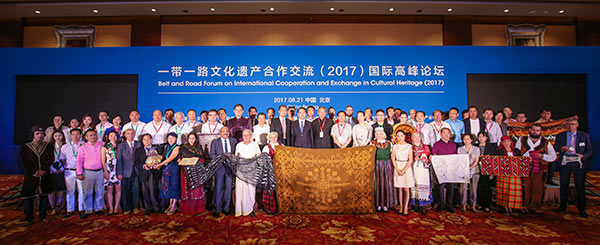Int'l forum on cultural heritage promotes cooperation

Participants pose for a group photo at the Belt and Road Forum on International Cooperation and Exchange in Cultural Heritage (2017) on Monday. [Photo provided to chinadaily.com.cn]
The Belt and Road Forum on International Cooperation and Exchange in Cultural Heritage kicked off in Beijing on Monday.
The forum aimed to discuss the theory and practice in international folk art protection and cultural heritage inheritance, and to collectively promote the cooperation and development in cultural heritage among countries involved in the Belt and Road Initiative.
Since President Xi Jinping proposed the Belt and Road Initiative in 2013, the initiative has gone from blueprint to practice, and cooperation has been extended from economy field to humanity. The folk culture and art exchanges in the field of cultural heritage have also been a major move in implementing the Belt and Road Initiative.
Tan Tianxing, deputy director of the overseas Chinese affairs office at the State Council, said there were more than 60 million overseas Chinese abroad, among which more than 40 million live in countries along the Silk Road Economic Belt and 21st Century Maritime Silk Road. Tan made the remark at the opening ceremony on Monday.
"They know the Western and Oriental cultures well, and are able to play an unique role in promoting the international cultural heritage exchanges," he said.
Tan added the problem we now face in promoting Chinese culture overseas is no longer going out, but how to melt in.
"Only by making foreign people feel the beauty of our culture and fall in love with our culture, can our culture spread wider," he said.
Tan then added the inheritance and innovation of cultural heritage is a systematic project, which needed effort from all respects.
"Jinan University, as one of the highest educational institution for overseas Chinese, is a major platform in realizing creative transformation of traditional culture, as well as international communication and cooperation," he said.
Tao Xiaonian, chairman of the China National Arts and Crafts Society, said folk art and traditional handicrafts have become an emotional bond linking different civilizations.
"During the development of the Belt and Road Initiative, regional cultures, ethnic traditions should be respected, cultural diversity should be protected, and to actively build a platform to showcase the handicrafts along the Silk Road," Tao said.
Chen Ping, sponsor of the forum, and dean of the Academy of Cultural Heritage and Creative Industry in Jinan University said, as high technology advances, traditional culture is disappearing and the presentation mode of civilization is also changing.
"How to make traditional handicrafts produce new values in modern era, how to make today's children gain confidence from traditional culture, and how to make traditional techniques bloom in contemporary era, these topics are among what the forum is discussing," Chen said.
Experts from the countries involved in the Belt and Road Initiative, such as Pier Francesco Funmagalli, deputy curator from Bibioteca Ambrosiana in Italy, Ahmed Youssef, chairman of Egyptian Handicraft Society and a professor of Cairo University, also delivered speeches at the forum.
Meanwhile, a group of officials from cultural departments, university professors, museum curators, experts in cultural heritage field and folk artisans from countries involved in the Belt and Road Initiative, such as Italy, Russia, Cambodia and Iran, participated in the forum.
Experts home and abroad also held a closed-door seminar during the forum, which concentrated on theories and policies in cultural heritage field, cooperative mechanisms of NGOs, cooperative projects in cultural heritage industry and cooperative workshops among folk artists.
The forum is supported by the China Overseas Exchange Association and the Internationale Rganisation Für Volkskunst (IOV), hosted by the China National Arts and Crafts Society and Jinan University, and undertaken by the Academy of Cultural Heritage and Creative Industry in Jinan University, founded in May this year.

